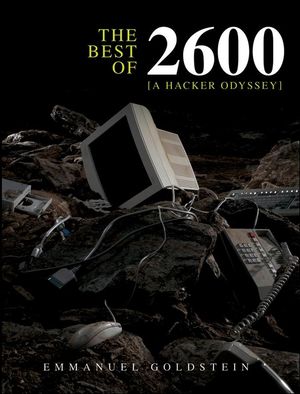Emmanuel Goldstein: The Best of 2600: A Hacker Odyssey (2008)
Filed under book | Tags: · computing, hacker culture, hacking, security, technology

Since 1984, the quarterly magazine 2600 has provided fascinating articles for readers who are curious about technology. Find the best of the magazine’s writing in Best of 2600: A Hacker Odyssey, a collection of the strongest, most interesting, and often most controversial articles covering 24 years of changes in technology, all from a hacker’s perspective. Included are stories about the creation of the infamous tone dialer “red box” that allowed hackers to make free phone calls from payphones, the founding of the Electronic Frontier Foundation, and the insecurity of modern locks.
Publisher John Wiley & Sons, 2008
ISBN: 978-0-470-29419-2
888 pages
Robert Hassan, Julian Thomas (eds.): The New Media Theory Reader (2006)
Filed under book | Tags: · free software, hacking, information society, information technology, intellectual property, interactivity, media theory, new media, public broadcasting, software, theory

The study of new media opens up some of the most fascinating issues in contemporary culture: questions of ownership and control over information and cultural goods; the changing experience of space and time; the political consequences of new communication technologies; and the power of users and consumers to disrupt established economic and business models.
The New Media Theory Reader brings together key readings on new media ndash; what it is, where it came from, how it affects our lives, and how it is managed. Using work from media studies, cultural history and cultural studies, economics, law, and politics, the essays encourage readers to pay close attention to the ‘new’ in new media, as well as considering it as a historical phenomenon. The Reader features a general introduction as well as an editors’ introduction to each thematic section, and a useful summary of each reading.
The New Media Theory Reader is an indispensable text for students on new media, technology, sociology and media studies courses.
Essays by: Andrew Barry, Benjamin R Barber, James Boyle, James Carey, Benjamin Compaine, Noam Cook, Andrew Graham, Nicola Green, Thomas Hylland Eriksen, Ian Hunter, Kevin Kelly, Heejin Lee, Lawrence Lessig, Jonathan Liebenau, Jessica Litman, Lev Manovich, Michael Marien Robert W. McChesney David E. Nye, Bruce M Owen Lyman Ray Patterson, Kevin Robins, Ithiel de Sola Pool, David Saunders, Richard Stallman, Cass R. Sunstein, Jeremy Stein, McKenzie Wark, Frank Webster, Dugald Williamson.
Publisher Open University Press, McGraw-Hill International, 2006
ISBN 0335217109, 9780335217106
326 pages
PDF (updated on 2012-12-5)
Comments (3)Douglas Thomas: Hacker Culture (2003)
Filed under book | Tags: · cyberpunk, hacking, security

A provocative look at the subculture that has shaped our changing attitudes toward the digital age.
Demonized by governments and the media as criminals, glorified within their own subculture as outlaws, hackers have played a major role in the short history of computers and digital culture-and have continually defied our assumptions about technology and secrecy through both legal and illicit means. In Hacker Culture, Douglas Thomas provides an in-depth history of this important and fascinating subculture, contrasting mainstream images of hackers with a detailed firsthand account of the computer underground.
Programmers in the 1950s and ’60s—”old school” hackers—challenged existing paradigms of computer science. In the 1960s and ’70s, hacker subcultures flourished at computer labs on university campuses, making possible the technological revolution of the next decade. Meanwhile, on the streets, computer enthusiasts devised ingenious ways to penetrate AT&T, the Department of Defense, and other corporate entities in order to play pranks (and make free long-distance telephone calls). In the 1980s and ’90s, some hackers organized to fight for such causes as open source coding while others wreaked havoc with corporate Web sites.
Even as novels and films (Neuromancer, WarGames, Hackers, and The Matrix) mythologized these “new school” hackers, destructive computer viruses like “Melissa” prompted the passage of stringent antihacking laws around the world. Addressing such issues as the commodification of the hacker ethos by Silicon Valley entrepreneurs, the high-profile arrests of prominent hackers, and conflicting self-images among hackers themselves, Thomas finds that popular hacker stereotypes reflect the public’s anxieties about the information age far more than they do the reality of hacking.
Publisher U of Minnesota Press, 2003
ISBN 0816633460, 9780816633463
Length 266 pages

